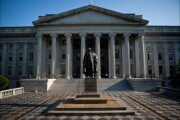
WASHINGTON — Last Friday, the Financial Stability Oversight Council issued a pair of proposals that were conceptually straightforward but nevertheless surprising, if only for their timing.
The proposals effectively unshackled the interagency council's ability to designate nonbank firms and activities as systemically important — a designation that brings with it as-yet-unspecified prudential oversight from the Federal Reserve. What had been shackling that power was a 2019 guidance document that stipulated that the council could only designate a firm or activity if it had undergone a cost-benefit analysis that determined that the costs incurred by the company or companies being designated are outweighed by the public benefit of such a designation.
Again, the substance of the proposals was not that surprising — the guidance in question was adopted after the Trump administration had un-designated the only two firms that still had the label, AIG and Prudential. The guidance was their way of blowing up the bridge to designation if and when a Democratic president was ever elected again. So here we are with a Democratic president, and it makes sense that his administration would reverse course.
But before this FSOC gets too far ahead of itself, its leaders would be wise to think about what they are actually trying to accomplish and how they might make those accomplishments durable. And to make nonbank designation more durable this time around, FSOC would be wise to consider what went wrong the last time so they don't make the same mistakes again.
Let's begin at the beginning. In 2008, the entire global economy was on fire, and it took an extraordinary effort to put that fire out. Once that had been done, lawmakers and regulators turned to the question of how to keep the economy from catching fire again, and the answer, in essence, was imposing higher capital and liquidity requirements (and many other things) than had been the norm before.
In the case of banks, imposing those new requirements involved some creative thinking, but the "how" was pretty straightforward — banks have been subject to regulatory and supervisory requirements for quite some time. Nonbanks — notably
In other words, public outrage was the impetus for Congress to create FSOC in the first place and the basis of its mandate to designate nonbank firms and activities as systemically risky.
So what changed? One
FSOC and the Biden administration are correct to empower FSOC to designate nonbank firms — and, more importantly,
This administration should be making that case, and not just on C-SPAN. Nonbank regulation was
Part of the reason why building the public case is important is
Maybe, just maybe, you could get all that done by the end of Biden's second term — if there is a second term. But even if there is and no mention of FSOC is ever made on the campaign trail, all of the council's efforts will be stymied every step of the way, and whatever is accomplished will be torn down entirely as soon as a Republican president takes office — unless there is a political price to pay for doing so.
Treasury Secretary Janet Yellen, in her remarks opening the FSOC hearing last Friday, made a pretty good first stab at making that case.
"Last month's events show us that our work is not yet done," she said, referring to the failures of Silicon Valley Bank and Signature Bank. "The authority for emergency interventions is critical. But equally as important is a supervisory and regulatory regime that can help prevent financial disruptions from starting and spreading in the first place."
If that's what this administration intends to put in place, then it's going to need to make people want it first. If they don't, I guess I'll just write this column again in 2036.






